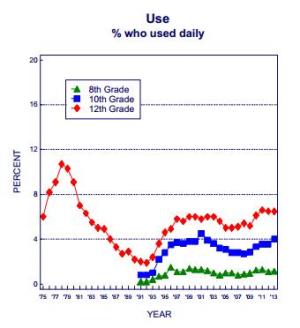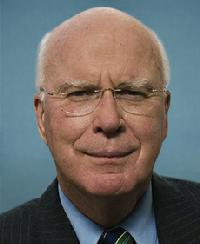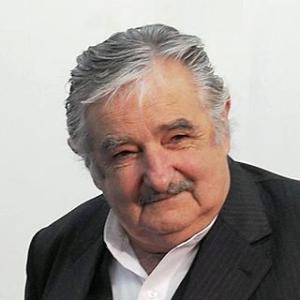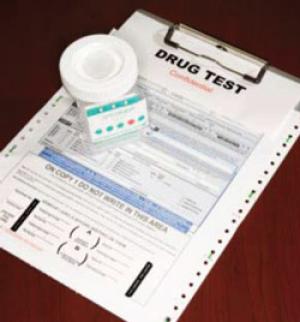Despite some improvement, the mainstream media continues to get it wrong on the drug issue in many, many ways. This makes it as crucial as ever for reformers to continue to fund and make our own media.
Breaking with his past practice, President Obama Thursday granted commutation to eight federal prisoners serving long sentences for crack cocaine-related offenses, including Clarence Aaron, who has been in for 20 years.
The latest Monitoring the Future numbers on teen drug use are out. Most drug use is down or stable, and teen marijuana use is well withing historic levels, but that isn't stopping some from sounding alarms.
In an era where so much of the national debate is still framed by prohibition-based thinking, our small, dedicated and passionate staff keep anti-prohibitionists on the cutting edge of legislation and policy. That's why we need your help to keep StoptheDrugWar.org and the Drug War Chronicle going strong in 2014.
The Senate Judiciary will be marking up three sentencing reform bills Thursday. They are significant ones.
Uruguayan President Mujica is not standing quietly by in the face of criticism from UN drug bureaucrats. Neither is his wife, an Uruguayan senator.
Guatemala is considering allowing the legal, controlled cultivation of opium poppies in a bid to weaken drug trafficking.
The Michigan Senate wound up its 2013 session by a passing a welfare drug testing bill. The House already passed one. Both will be alive when the legislative session starts up next year.
Oregon's plan to regulate dispensaries statewide moves ahead, Washington state looks like it will let medical marijuana patients keep their personal grows, a new national certification program is announced, and more.
A Minnesota man is dead of an apparent overdose after swallowing drugs during an arrest, and a Washington state man was shot and killed by police as they attempted to arrest him after an undercover drug buy. They are the 37th and 38th domestic drug war fatalities of the year.
More cops with pain pill problems, one who seemed like he was headed to (or from) a party, and a Texas parole officer gets too tight with a parolee.
A push is on to end the federal ban on needle exchange funding, a secret federal panel meets to discuss marijuana banking issues, UN anti-drug bureaucrats are still unhappy with Uruguay, more bodies show up in Mexico, and more.
It looks like Washington state medical marijuana patients will continue to be able to grow their own, Seattle City Attorney Pete Holmes wants to welcome pot tourists, the Michigan Senate takes aim at welfare drug users, Indian Maoists are profiting from prohibition, and more.
Uruguay's president defends marijuana legalization there and finds an ally, marijuana bills are popping up in some surprising countries, the Justice Department says we have a federal prison crisis, and much more.
Seattle and Denver get down to the nitty-gritty of dealing with the details of marijuana legalization, a conservative Southern congressman comes out for medical marijuana, Detroit cops go on mass raids, and a British TV debate over drug policy gets heated. And more.
They may be smoking more pot in Washington state than anyone thought, the Florida medical marijuana signature-gathering campaign is going down to the wire, opium production is up in the Golden Triangle, and aerial eradication is paused in Colombia (after planes get blown out of the sky). And more.
Today we have a plethora of pot polls, hope on banking, an important decision by Washington state regulators, and hints of change to come from Canada's Tories, among other news.
David Borden, Executive Director

David Borden
One of our rituals in the United States is the annual release of two major national surveys of drug use -- the National Survey on Drug Use and Health (
NSDUH), carried out by the federal government, and
Monitoring the Future (
MTF), federally funded but performed by researchers at the University of Michigan.
MTF, which has queried
8th,
10th and
12th graders about their drug use rates and their perceptions about drugs (illicit as well and licit drugs) since the '
70s, came out with their
annual survey results yesterday morning. Unfortunately, one tends to derive very different impressions when reading the sober (so to speak) discussions provided by
MTF's scientists, vs. the alarmingly written materials disseminated by government agencies to the press.
The drug news for 2013 was actually fairly good, at least overall. Use of most drugs was steady or even declined. One of MTF's two press releases noted that youth cigarette smoking has declined! Young people have also become more cautious when it comes to use of synthetic drugs as well, according to the other release -- the direction of change in use rates varies by age group, but it's a positive sign. Much of the discussion in the media, however, was about marijuana use. Use by seniors declined in 2013, relative to 2012, but use of marijuana by 8th and 10th graders increased.
As a chart from the MTF report that I've pasted below shows, though, it didn't increase by very much. More importantly, it didn't reach a level out of line with the rates surveyed for those age groups during the past few decades. It's a far lower rate, in fact, than when MTF first started surveying. The most recent qualitative discussion about marijuana use was published last February, in a historical report using data through 2012. It soberly noted both upturns and downturns in annual and daily use levels among the age students surveyed: including declines during 2006 through 2008; increases in 2010; mixed developments in 2011; and decreases or leveling off in 2012. All of the 2013 numbers for marijuana are very close to those found for 2012.
Enter the drug czar. In remarks accompanying a video prepared for the media, Office of National Drug Control Policy director Gil Kerlikowske proclaimed, "These increases in marijuana use over the past few years are a serious setback in our nation's efforts to raise a healthy generation of young people." Kerlikowske took a swipe at marijuana legalization in Colorado and Washington too, an article from the McClatchy news service notes, also claiming medical marijuana has made it easier for young people to obtain the drug. But there is mixed evidence for that at best. For example, a recent study published in the American Journal of Public Health found that medical marijuana laws "have not measurably affected adolescent marijuana use in the first few years after their enactment," though noting that what happens in the short-term does not necessarily tell us what may happen in the long term.

Use of any psychoactive substance by teenagers is a legitimate concern, even marijuana. But the drug czar's hyperbolic characterizations don't match the substance of the report very well. His claims about the impact of liberalized marijuana policies also fall well short of providing any substantive analysis on the topic. That's not surprising for a politically appointed anti-drug official. But if it isn't very surprising that media would uncritically buy into it, it is disappointing to see it still happening on this issue in 2013. They could have printed the drug czar's comments, but also those of some independent voices. Or they could at least have looked at the actual report to see what its academics authors felt was important to highlight. Instead they ran a scare story -- just what the drug czar wanted.
Kids and marijuana use is just one of many drug policy areas in which mainstream media, despite some general improvement and increased interest in our side of the issue often still falls short. Here are some others:
- Synthetic drugs are said to be growing in popularity, even as they arguably become less popular. An article in the Florida Sentinel described "bath salts" drugs as "increasing popular" in the article's header. One had to scroll down well into the article to find out that Florida has seen a one-third decrease in emergency room mentions in the state for bath salts.
Florida law allows for up to five years imprisonment for possession of more than three grams of synthetic drugs -- a draconian policy that reporting like this unwittingly helps to foster. No mention is made in most such stories of the possibility for reducing the dangers of synthetic drugs through regulation rather than prohibition -- an approach taken in New Zealand, for example.
- The attorneys general of 28 states have asked the FDA to reverse its approval of the drug Zohydro, a new form of the opioid painkiller hydrocodone. Articles about Zohydro have failed to note other articles reporting that crackdowns on pain pill diversion have cause heroin use to rebound, however, or to discuss the ways that some patients would benefit from Zohydro, for example by not chronically taking the other ingredient commonly included included in such medications, acetaminophen, which can damage the liver.
Of course they also failed to discuss "opiophobia," the hesitance physicians often have to prescribe the needed doses of these medications or to prescribe them at all, even when they are painfully needed by the patients, such pain itself having other health harms if not treated well. Even as use of opioids has grown, undertreatment of pain also continues for many patients in many cases, and law enforcement has played a role in creating and sustaining that.
- Lawmakers, including some who normally are good on drug policy, recently asked the US Sentencing Commission to toughen sentences for growing marijuana on public lands. Media reports reports failed to note the harsh sentences federal law already for provides marijuana growing, or the dubiousness of proposals to lengthen sentences in the country with the world's highest incarceration rate. Undoubtedly it will remain illegal to cultivate marijuana on public lands under legalization, at least without a permit and proper procedures for it. But that doesn't mean that longer prison terms is the way to address it, now or in the future.
- Media have often gotten the nature of the federal-state conflict on marijuana legalization wrong. An otherwise strong article in the Washington Post last August, for example, carelessly claimed that the Colorado and Washington legalization initiatives "directly violate the federal Controlled Substances Act, which prohibits the production, possession and sale of marijuana."
As I pointed out in a series of blog posts after the election, most legal scholars don't believe that the initiatives violate federal law or could be preempted in federal court, although one couldn't say for sure unless they got tested in court. Our federalist system is specifically designed for states to have different policies on the books than the federal government does, so long as their policies don't prevent the federal government from using its own resources to enforce federal policies. And the state laws don't do that, nor do they involve state employees in growing or distributing marijuana themselves. All they're doing is defining how the state will or won't use its own enforcement resources.
Notably, no federal official has sought to overturn a state medical marijuana law in the 17 years since one was first enacted. The kinds of misconceptions that this kind of careless misstating on an important point of law in this evolving issue can have a chilling impact on the decisions made by lawmakers in other states as well as localities.
- Perhaps the saddest type of story, that has continued with no change yet, is that of the mundane local drug bust. We don't even usually cover them here. But one recent story that I've selected at random is that of a New Jersey woman accused of marijuana in the mail. The reported 18 pounds is a lot, but it was probably worth just a fraction of the $72,000 that police in their typical act of exaggeration claimed it could get on the street. Maybe there's some reason I don't know that it could.
But most unfortunate part of this -- and I don't blame the reporter for this at all, but it's important -- is the lack of reflection on whether it actually reduces the drug supply or actually helps anyone to do these busts (it doesn't), or what it means to arrest and incarcerate people, in many cases subjecting them to lengthy prison terms, over a substance that a majority of Americans now believe should actually be legal, and that more believe should at least be decriminalized. It's a moral issue that seems to be lost on most actors in the criminal justice system, though not all.
As we approach 2014, I've highlighted some continuing shortcomings in mainstream media coverage of drug issues, in part to illustrate why we believe it is still up to reformers to fund and make our own media -- a drumbeat sounding clear and true against the fear and misinformation, turning a few more heads every year and normalizing rational debate. I hope you will support our organization to financially be able to continue in 2014.
back to top
The White House announced yesterday that President Obama had granted commutations to eight federal prisoners serving decades-long sentences for crack cocaine offenses, including poster boy for drug war excess Clarence Aaron, who has spent the last 20 years behind bars. The president also pardoned 13 former prisoners.

Finally, Clarence Aaron will go free.
"Commuting the sentences of these eight Americans is an important step toward restoring fundamental ideals of justice and fairness," the president said. "But it must not be the last. In the new year, lawmakers should act on the kinds of bipartisan sentencing reform measures already working their way through Congress. Together, we must ensure that our taxpayer dollars are spent wisely, and that our justice system keeps its basic promise of equal treatment for all."
[Editor's Note: The Senate Judiciary Committee was marking up three sentencing reform bills this same day.]
Some sentencing reforms have been enacted since the harsh escalation of the drug war in the Reagan era, including the Fair Sentencing Act of 2010. It was unfair to continue to let people languish serving sentences no longer applicable, Obama suggested.
"If they had been sentenced under the current law, many of them would have already served their time and paid their debt to society," he said." Instead, because of a disparity in the law that is now recognized as unjust, they remain in prison, separated from their families and their communities, at a cost of millions of taxpayer dollars each year."
The commutations are a departure for the Obama administration, which until now has been the stingiest in recent presidential history when it comes to the pardon power. Before today, Obama had issued only one commutation, where someone currently serving a sentence is actually released from prison, and 39 pardons of people who had already been released, some of them decades ago.
While all eight people whose sentences were commuted suffered for years under the impact of harsh federal sentencing laws racially biased in result if not, charitably, in intent, Clarence Aaron in particular has served as the face of the unjustly punished deserving of presidential mercy. Then a college student, the first-time, nonviolent drug offender was sentenced to three life sentences for a peripheral role in a cocaine deal in 1993.
A model prisoner, his case became widely known as a result of a PBS News Frontline special about the use of informants in drug cases. His case drew additional publicity when the investigative journalism consortium ProPublica documented problems with the Office of the Pardon attorney, using Aaron's more than a decade-long effort to obtain a pardon as Exhibit #1.
Aaron's reaction to the news was not surprising.
"He was just overcome," said his attorney, Margaret Love, herself a former US Pardon Attorney, who spoke with Aaron this morning shortly after he received the news. "We're very grateful to the president," she told ProPublica after the commutations were announced.
That all the commutations were for crack cocaine-related offenses, Love said, "says something very important about the long federal sentences for drug crimes. There are a lot of people in prison whose cases are similar to the ones being commuted."
The sentencing reform group Families Against Mandatory Minimums (FAMM) said four of its supporters, including Aaron, had had their sentences commuted, but that there were many more who deserved to come home, too.
"Now that the president has opened the door to doing commutations, he might make it a more regular activity, and not just save it for the holidays or the end of his term," said FAMM president Julie Stewart. "He certainly has plenty of cases that he could choose from. I guess that time will tell."
Other sentencing and drug reform organizations were pleased and encouraged by the news, but joined FAMM and the president in calling for more.
ACLU deputy legal director Vanita Gupta chimed in, "President Obama today gave several Americans who were unnecessarily sentenced to die behind bars the chance to reunite with their families. This is one important step toward undoing the damage that extreme sentencing has done to so many in our criminal justice system. We hope the President will continue to exercise his clemency powers and lend his support to systemic reform that will make our criminal justice system smarter, fairer, and more humane." A recent report by the ACLU on people serving life without parole sentences highlighted the cases of four of the people who received commutations this week -- Aaron, Stephanie George, Jason Hernandez, and Reynolds Wintersmith, Jr.
"It's wonderful news that Obama has granted clemency to these individuals. We hope this is the just the beginning of the President using his executive powers to right the wrongs of the criminal justice system," said Anthony Papa, media relations manager for the Drug Policy Alliance, who was granted clemency in New York State in 1997 after serving 12 years under the notorious Rockefeller Drug Laws. "I hope governors with the same power at the state level follow his lead and reunite more families."
"Through his actions today, the President has signaled his willingness to undertake needed reforms to the criminal justice system," said Nicole Austin-Hillery, director of the Brennan Center for Justice Washington, DC, office. "For too long, harsh sentences and punitive policies have fed a system of mass incarceration in this country. A comprehensive effort, involving the Administration and Congress, is needed to solve this crisis and return balance to the scales of justice by creating a more rational, fair, and cost-effective criminal justice system."
"We commend the President on this right and just action. It shows bold and necessary leadership," said Barbara Arnwine, president and executive director of the Lawyers' Committee for Civil Rights Under Law. "This marks a year in which the administration has taken great leadership on criminal justice issues. From the statements of Attorney General Holder to the American Bar Association in August, to the implementation of their policies, this shows a trajectory towards real justice in the criminal justice system."
The trajectory may be there, but take-off has yet to be achieved, several advocates warned.
Wade Henderson, president and CEO of the Leadership Conference on Civil Rights, said in a statement, "Until there is legislative action to make the Fair Sentencing Act retroactive, these commutations are the only relief available to federal inmates and their families. But the administration can only do so much; it is up to Congress to address this systemic failure.
"Kudos to President Obama for commuting these eight people," said DPA executive director Ethan Nadelmann. "But shame on the President for not commuting many more. With over 100,000 people still behind bars on nonviolent drug charges, clearly thousands more are deserving of the same freedom. Congress should act immediately to reduce the draconian federal mandatory minimum sentences that condemn thousands to decades behind bars for nonviolent drug offenses."
And while the commutations are welcome, they are not the real solution, said FAMM's Stewart.
"Even if President Obama used his clemency power energetically, which he has not, he simply wouldn't be able to commute every excessive sentence," she said. "The sentencing laws themselves are the problem. Congress needs to get moving and pass mandatory minimums sentencing reforms that save the worst prison terms for the worst offenders," Stewart said. "We hope there will be even more commutations today, but it's only Congress that can prevent the need for commutations tomorrow."
Still, it is good that Clarence Aaron and a few others are going home.
back to top
This year's annual Monitoring the Future (MTF) survey on the habits of 8th, 10th, and 12th graders was released Wednesday, and most of the results were uncontroversial. But with two states having already legalized marijuana for adults and opinion polls suggesting more and more Americans are ready to move ahead with legalization, battles are raging over the numbers on teen marijuana use and what they mean.
The survey found that for most drugs, teen use levels are stable or declining. Synthetic marijuana use was down, as was cigarette smoking, alcohol drinking, and the use of inhalants, synthetic stimulants, prescription
opioids, salvia
divinorum, and hallucinogens other than LSD.
Drugs where teen use levels were stable included LSD; amphetamines; Adderall, specifically; Ritalin, specifically; ecstasy; cocaine; crack; heroin; methamphetamine; crystal methamphetamine; sedatives; tranquilizers; Rohypnol; Ketamine; and steroids. For most of these drugs, use levels even in 12th grade were quite low. For instance, 2.2% of seniors reported using LSD, 2.3% reported using Ritalin, and 4.0% reported using ecstasy.
When it comes to marijuana, 23% of seniors said they smoked in the month prior to the survey, 18% of 10th graders did, too, and so did 12% of 8th graders. Some 6.5% of seniors reported daily use, as did 4.0% of 10th graders, and under 2% of 8th graders.
It helps to put those numbers in historical perspective. All of the numbers are above the historic lows in teen drug use reported at the end of the Reagan-Bush era in the early 1990s, but well below the historic highs in teen drug use reported in 1979, just before the Reagan-Bush era began.
For seniors, the all-time low for monthly use was 11.9% in 1992, but the recent high was 23.1% in 1999. This year's 22.7% is actually a decline of two-tenths of a percent from 2012, and in line with figures for the past decade showing rates hovering in the upper teens and low twenties. It's a similar story at the younger grade levels.
The survey also found that the notion that regular use of marijuana is harmful is losing favor among teens. Only 39.5% of seniors saw it as harmful, down from 44.1% last year, and down significantly from views over the past two decades.
Despite the relative flatness of the marijuana use numbers, some warned that the sky is falling, cherry-picking the numbers and warming to favored themes to support their points of view.

Ever since Reefer Madness days, teen marijuana use has worried the grown-ups.
"Let these numbers be a wakeup call to parents and decision-makers alike," said Kevin
Sabet, a former senior drug policy advisor in the Obama Administration now serving as the director of
Project SAM (Smart Approaches to Marijuana). "There is no way to properly 'regulate' marijuana without allowing an entire industry to encourage use at a young age, to cast doubt on the science, and to make their products attractive -- just like Big Tobacco did for 50 years. Today's Big Marijuana is no different."
"These increases in marijuana use over the past few years are a serious setback in our nation's efforts to raise a healthy generation of young people," said Gil Kerlikowske, director of the Office of National Drug Control Policy. "Teens deserve to grow up in an environment where they are prepared to meet the challenges of the 21st century, and drug use never factors into that equation. Today's news demands that all of us recommit to bolstering the vital role prevention and involved parenting play in keeping young people safe, strong, and ready to succeed."
"This is not just an issue of increased daily use," said Nora Volkow, director of the National Institute on Drug Abuse (NIDA). "It is important to remember that over the past two decades, levels of THC -- the main psychoactive ingredient in marijuana -- have gone up a great deal, from 3.75% 1995 to an average of 15% in today's marijuana cigarettes. Daily use today can have stronger effects on a developing teen brain than it did 10 or 20 years ago."
Volkow also latched onto figures showing that 12% of 8th graders had tried marijuana in their lives.
"We should be extremely concerned that 12% of 13- to 14-year-olds are using marijuana," Volkow added. "The children whose experimentation leads to regular use are setting themselves up for declines in IQ and diminished ability for success in life."
In 2012, MTF added questions about where students obtain marijuana. In states that have medical marijuana, 34% of pot-smoking seniors said one of the ways they got their marijuana was through someone else's prescription (recommendation). And 6% said they got it with their own recommendation.
"A new marijuana industry is forming in front of our eyes, and make no mistake about it: they are delighted their customers -- today's youth -- consider their product safe," remarked former Congressman Patrick J. Kennedy, a Project SAM cofounder. "The rise of legalization and medical marijuana has sent a message to young people that marijuana use is harmless and non-addictive."
But while the drug czar, Dr. Volkow, and Project SAM were sounding the tocsin about the threat of teen marijuana use, others reacted more calmly, taking solace from the findings that teen cigarette smoking and drinking, not to mention other drugs, had declined.
"These findings should put to rest any claims that reforming marijuana laws and discussing the benefits will somehow contribute to more teens using marijuana," said Mason Tvert, director of communications for the Marijuana Policy Project. "It's time for prohibition supporters to stop hiding behind teens when debating marijuana policy."
The declines in teen cigarette smoking and drinking show that regulation -- not prohibition -- is the way to address substance use, Tvert said.
"Regulation clearly works and prohibition has clearly failed when it comes to protecting teens," he argued. "Regulating alcohol and tobacco has resulted in significant decreases in use and availability among teens, and we would surely see similar results with marijuana. At the very least, this data should inspire NIDA and other government agencies to examine the possibility that regulating marijuana could be a more effective approach to preventing teen use."
back to top
Stopping the Drug War Means Winning the Information War.
As a subscriber to StoptheDrugWar.org, you know that this is an exciting and critical time for those who believe that prohibition and the global drug war in its current form need to end.
You're learning about the state-level revolt against federal marijuana laws, how the prerogatives of the drug war corrupt local police departments, and the real, nuanced policy story behind the headlines.
Stories are important. With each one we tell, we chip away at the prohibitionists' decades-long stranglehold on the drug policy debate. Things are starting to change. And we need your help to keep the momentum.
Why It's Critical to Support our "Unfinished Business" Campaign Today.
In an era where so much of the national debate is still framed by prohibition-based thinking, our small, dedicated and passionate staff keep anti-prohibitionists on the cutting edge of legislation and policy. Our platform serves as a vital information source for reform efforts -- locally, nationally, and globally -- and amplifies their efforts for audiences they couldn't have hoped to reach otherwise. Our mission to provide the best information available on the global drug war and its costs is critical to the national and global efforts to end it.
But we need your help to keep going strong in 2014. You can help our small and prolific team of experts pay their bills so they can stay focused on the great content that brings light to critical prohibition issues.
The mainstream media has been a depressingly dependable source of fear-based misinformation in the drug debate, predictably amplifying the talking points of those whose livelihoods depend on the expansion of the wasteful, corrupt and unjust global drug war.
That's why it's the duty of reformers to fund and make their own media -- a drumbeat that sounds clear and true against the fear and misinformation, turning a few more heads every year and slowly normalizing rational debate.
For $3.49 a Month -- About the Price of One Gallon of Gas -- You Can Fuel our Efforts and Keep Our Editorial Staff Working on the Drug War's Biggest Stories.
We ask that you support our mission by authorizing a recurring monthly gift of $3.49. It's easy, secure, and will keep our talented writing and policy team focused on the issues that we all care about -- and hope more people will care about as the drumbeat builds.
Advancing information, research and informed argument in the national debate is critical to not just marijuana legalization, but ending the drug war on all fronts. America is at a crossroads. And so is StopTheDrugWar.org. Will you give up one gallon of gas to help us keep fighting the good fight in 2014?
Yes! I Can Give Up a Gallon of Gas a Month to Keep StopTheDrugWar.org's Writers Working.
Watch Drug War Chronicle editor Phil Smith's award acceptance speech at the International Drug Policy Reform Conference in Denver last October:
back to top
The Senate Judiciary Committee will be working on a trio of sentencing reform bills Thursday. Committee Chair Sen. Patrick Leahy (D-VT) is attempting to create a comprehensive sentencing bill that will attract bipartisan support.

Pat Leahy
The three bills are the Smarter Sentencing Act (
Senate Bill 1410), the Recidivism Reduction and Public Safety Act (
Senate Bill 1675), and the Justice Safety Valve Act (
Senate Bill 619).
The Smarter Sentencing Act expands mandatory minimum sentencing reform by making the 2010 Fair Sentencing Act retroactive and reducing the length of many mandatory sentences by half.
The Recidivism Reduction and Public Safety Act would increase good time credits for rehabilitative programs, while the Justice Safety Valve Act would allow judges to sentence below mandatory minimums if certain circumstances are present.
The bills are backed by a broad coalition of civil rights, drug reform, and faith groups, as well as conservative and law enforcement and victim rights groups.
The hearing is set for 10:00am EDT Thursday. You can watch it online here.
back to top
Uruguayan President Jose Mujica has certainly gotten attention on the world stage since his country legalized marijuana commerce last week, and not all of it has been favorable. The United Nations bureaucrats charged with maintaining adherence to global drug prohibition have been quick to criticize, and now Mujica and his wife, Uruguayan Senator Lucia Topolansky, have fired back.

Uruguayan President Mujica strikes back at critics, and so does his wife. (gob.uy)
Two of the three UN drug control bureaucracies, the International Narcotics Control Board (
INCB) and the UN Office on Drugs and Crime (
UNODC) came out with quick criticisms of the Uruguayan move, with
UNODC head Yuri
Fedotov calling the decision to legalize marijuana there "unfortunate" in a
statement two days after the vote.
But it was the INCB that leveled the harshest criticisms, and it was INCB that drew the barbed retorts from Montevideo's first couple.
"Uruguay is breaking international conventions on drug control with the cannabis legislation approved by its congress," INCB complained in a press release last Wednesday. The INCB qualified itself as "surprised" that Uruguay had "knowingly decided to break the universally agreed and internationally endorsed legal provisions of the treaty."
In the statement under the signature of INCB head Raymond Yans, the INCB also "regrets that the government of Uruguay did not respond to INCB to engage in a dialogue prior to further consideration of the law."
"Tell that old man to stop lying," Mujica retorted in an interview Saturday with Uruguay's Canal 4. "Let him come to Uruguay and meet me whenever he wishes… Anybody can meet and talk to me, and whoever says he couldn't meet with me tells lies, blatant lies. Because he sits in a comfortable international platform, he believes he can say whatever nonsense," he added.
Mujica also accused the INCB of relative quiescence before the legalization of marijuana in two US states and accused him of having double standards. "Does he have different rules: one for Uruguay and other for the world's strong countries?" he asked pointedly. [Ed: INCB did criticize the Colorado and Washington votes.]
Neither was Sen. Topolansky one to sit quietly by while her husband was under attack.
"Who is this fellow that likes to call names to countries?" she said of Yans. "I think he crossed the line, but anyhow, I believe that he has had problems with other countries, Sweden, Denmark, Holland, and they will be meeting him sometime in March."
Topolansky was presumably referring to recently leaked documents revealing deep divisions on what to do about drug policy among UN members, where a number of countries have asked that the 2016 UN General Assembly Special Session (UNGASS) on drugs be opened to discussion of paradigm-shifting reforms.
It's not as easy being the head of a UN anti-drug bureaucracy as it used to be.
back to top
Guatemalan President Otto Perez Molina and other government officials said repeatedly this week that they are considering legalizing and regulating opium poppy production in areas where it is already being grown illicitly.
"We started exploring the capacity that we could have for controlled planting," said Perez Molina. "What that means is that we would know exactly what extensions are being planted, what the production would be and that the sale would also be well controlled, especially for medicinal use."
Interior Minister Mauricio Lopez said the government was considering both regulated legal cultivation and alternative development.
"There are two paths, one is cultivated substitutes, and the other is the alternative which is controlled cultivation," Lopez explained. "This is what is already being done in other countries such as India and China, that is to say identifying hectares clearly, seeing how they are grown, carrying out the harvest, taking control of the commercialization and above all making sure this serves mainly the pharmaceutical industry."
Lopez noted that Guatemalan security forces have had 25 years of experience eradicating opium poppies, but that the impact had been "relative."
Guatemalan poppy production is centered in the department of San Marcos, near the Mexican border.
According to the Guatemalan media outlet Prensa Libre, the idea is one of a number of drug reform proposals made to the government by Amanda Fielding of the Beckley Foundation, a British drug reform group that established an office in Guatemala last year.
Perez Molina has been a leading, vocal advocate of reassessing the global drug prohibition framework, especially as it applies to Latin America. But this is the first time his administration has hinted at a concrete "outside the box" proposal, even if only a little outside the box.
back to top
In one of its final acts of the 2013 session, the Michigan Senate last Thursday passed a bill that would allow drug testing of some welfare recipients for "reasonable suspicion." The bill passed the GOP-dominated chamber on a straight party line vote.
The measure is
Senate Bill 275, sponsored by Sen. Joe
Hune (R-Hamburg Township).
A similar measure passed the House in May. Neither bill has been approved by the other chamber, but both will still be alive and could pass next year.
The bill directs the state Department of Human Services to set up a three-county pilot project of drug screening and testing for the Family Independence Program, the state's program that provides cash assistance to poor families with children and pregnant women.
If the initial screening creates "reasonable suspicion" of drug use, recipients would be required to submit to a drug test. Those who tested positive would be referred for treatment, with a second positive test leading to loss of benefits.
"We have children going to school hungry every day without proper clothing because their parents are addicted to drugs and alcohol," claimed state Sen. Rick Jones (R-Grand Ledge) in remarks reported by Michigan Live. "They receive welfare money but they don't spend it on their children. They spend it on their addiction."
The measure passed the Senate in a straight party-line vote. All Democrats opposed the measure despite winning an amendment that would allow children whose parents test positive for illegal drugs to continue receiving benefits through a third party, such as a guardian.
Drug testing has been a big issue for Michigan Republicans this year. Earlier this year, the legislature passed and Gov. Rick Snyder (R) signed into law a bill allowing the state to cut unemployment benefits to anyone who failed a pre-employment drug test.
back to top
Oregon's plan to regulate dispensaries statewide moves ahead, Washington state looks like it will let medical marijuana patients keep their personal grows, a new national certification program is announced, and more. Let's get to it:
NationalOn Tuesday, Americans for Safe Access launched the Patient Focused Certification program, which will independently certify the quantity and reliability of medical marijuana products sold at licensed businesses. The program will be based on new quality standards set by the American Herbal Products Association and the American Herbal Pharmacopeia.
California
Last Thursday, the Shasta County planning commission voted to move forward with restrictions on medical marijuana grows. Planners voted 3-2 to limit outdoor gardens, placing restrictions on the number of plants allowed based on property size, among other considerations.
On Tuesday, Lake County supervisors approved a new cultivation ordinance. The unanimously approved ordinance bans outdoor grows within "community growth boundaries" and limits indoor grows to 100 square feet and 1,200 watts of lighting. Outdoor grows can't occur within a thousand feet of schools or other youth-oriented facilities and will be limited to six mature or 12 immature plants. The ordinance goes into effect 30 days from Tuesday.
Also on Tuesday, the Long Beach city council continued to wrestle with the dispensary issue. Council members voted to direct the planning commission to consider a cap on dispensaries and setback restrictions. The city attorney is also asking for further clarity from the council, whose proposed restrictions have prevented him from drafting a workable ordinance. The city banned collectives of more than three persons last year, causing the number of dispensaries in the city to shrink from 55 to six.
Also on Tuesday, Tulare County supervisors adopted criteria providing general guidelines for law enforcement and county officials. This is a first step toward adopting regulations and restrictions on cultivation, which the county will take up next month. The guidelines call for grows and dispensaries to be licensed by the state and be nonprofit. They would also bar anyone with a felony conviction from being involved in a medical marijuana operation.
Colorado
Last Thursday, state health officials said they were considering lowering medical marijuana patient fees. Currently, patients pay $35 a year for their medical marijuana cards; the fee would drop to $15 under the proposal. That's because the state fund that pays for the patient registry is awash with more than $13 million in cash.
Guam
Last Thursday, a medical marijuana bill got a second public hearing. The measure, Bill 215, was supported by numerous members of the public, but Department of Public Health Director James Gillan said he couldn't support it because of the "administrative and regulatory burden" it imposes. The Committee on Health is still accepting written testimony on the measure and for those who wish they will keep their testimony confidential, and bill cosponsor Sen. Tina Muna Barnes said she was working on amendments based on feedback from the hearings.
Illinois
Last Friday, Illinois officials unveiled a new web site to provide information on medical marijuana. The state's new medical marijuana law goes into effect January 1, and the website provides information about implementation updates, draft and final administrative rules, application forms, FAQ's, press releases and other materials related to medical marijuana.
On Monday, state financial regulators filed a complaint against the doctor who runs Wicker Park's first medical marijuana business. Dr. Brian Murray of Good Intentions LLC is accused of accepting fees from potential patients before establishing a "legitimate physician-patient relationship," which is required under state law. He was charging patients $99 before their evaluations, which can't be done before the law goes into effect. Good Intentions manager Daniel Reid slammed the complaint, calling it "utterly false, entirely speculative and anti-patient."
Massachusetts
Last Thursday, the Department of Public Health announced the members of the committee to review medical marijuana business applications. The complete list of names is at the link. The committee will be charged with evaluating and scoring 100 applications submitted for up to 35 medical marijuana dispensary licenses.
New Jersey
Last Thursday, the Assembly Health Committee approved an expansion of the medical marijuana program that would allow patients to buy the drug in another state and use it in New Jersey. The bill, Assembly Bill 4537, now heads to the full Assembly, but faces a veto threat from Gov. Chris Christie (R).
Oregon
Last Wednesday, a committee approved draft rules for state-regulated dispensaries. They include onerous security requirements, hefty fees, and criminal background checks. The application process for state-regulated dispensaries will begin on March 3.
Washington
Last Thursday, the state Liquor Control Board signaled it would recommend medical marijuana patients could keep their personal grows though not at the same plant quantity levels as law currently allows. State officials including staff of the Board had proposed eliminating the patient grows as part of the adoption of general marijuana legalization, which does not include the right to grow your own. But that proved hugely unpopular with patients. The board is expected to formalize its support for patient grows with a vote this week.
[For extensive information about the medical marijuana debate, presented in a neutral format, visit MedicalMarijuana.ProCon.org.]
back to top
A Minnesota man died late last month after being arrested on drug charges, and a Washington state man was shot and killed late last week in a drug bust gone bad. Philip Derks of St. Paul and as yet unnamed Wenatchee, Washington, man become the 37th and 38th persons to die in US domestic drug law operations so far this year.
In the Washington case, according to the
Wenatchee World News, citing police sources, members of the Columbia River Drug Task Force had made repeated undercover drug buys from the man, then used uniformed police to pull him over in a traffic stop. The man pulled into a Taco Bell drive-in lane, and a police car pulled in behind him.
"The officer exited the vehicle and contacted the suspect," said Trooper Darren Wright of the State Patrol, which is conducting the investigation into the killing. "A struggle ensued and resulted in the shooting."
Wright said it was not clear if the man had a gun, or if he had fired any shots. He said the unnamed police officer shot more than one shot.
The mid-afternoon shooting at the popular fast-food restaurant resulted in the victim's vehicle rolling forward and striking an occupied pick-up truck in the parking lot. No injuries were reported there.
No word on what drugs the task force was chasing.
{Update: The man has been identified as Robert Harris, 43, of Wenatchee. The coroner reported he died of multiple gunshot wounds. Still no word on whether he had a gun.]
In the Minnesota case, according to the Minneapolis Star-Tribune, Philip Derks, 32, had been arrested on November 28 along with the driver of the vehicle in which he was riding after police who stopped them for a traffic violation saw a plastic baggie containing an unknown substance being thrown from the vehicle.
A preliminary field test identified the substance as methamphetamine, and Derks and his companion were taken to the Ramsey County Jail. Within a half hour of their arrival at the jail, Derks' friend alerted jail staff that he needed medical attention. Jail staff wrote that he didn't appear to be under duress, but was fidgety and starting to sweat.
Jail staff moved him to a segregation cell for closer observation after he mentioned Adderall but "refused to answer other questions." Derks grew "even more restless, became very pale, and was sweaty," staff noted before transporting him to a local hospital.
Derks died in the hospital about 18 hours after arriving there. His friend told sheriff's deputies that Derks had swallowed an unknown amount of drugs to hide them from police when they had been pulled over the previous day.
back to top
More cops with pain pill problems, one who seemed like he was headed to (or from) a party, and a Texas parole officer gets too tight with a parolee. Let's get to it:
In Kaplan, Louisiana,
a Gueydan police officer was arrested last Thursday after he was pulled over with a virtual party supply in his vehicle. Officer Kenneth Martin, 26, was found with a half-ounce of marijuana, 19
hydrocodone pills, an open bottle of liquor, and a semi-automatic handgun. He was charged with vehicle equipment violation, possession with the intent to distribute marijuana, possession with the intent to distribute a schedule III narcotic, open alcoholic container, possession of a firearm in the presence of a controlled dangerous substance and obstruction of justice.
In Houston, a former Texas state parole officer was convicted last Tuesday on federal charges she accepted bribes from a parolee heroin dealer in return for warning him of police investigations. Crystal Washington, 53, was found guilty of conspiracy to possess with intent to distribute heroin, plus conspiracy to commit extortion. She's looking at up to 60 years in prison, but is free on bond, with an electronic monitor attached to her ankle.
In Oakland, a former San Luis Obispo police officer was sentenced Monday to 18 months in federal prison for taking cash and pain pills from people he was supposed to be investigating as part of the department's drug task force. Cody Pierce, 40, had copped earlier to one count of extortion. In return for the cash and pain pills, he gave them fake oxycodone pills that they could sell.
In Hartford, Connecticut, a former state prison guard was sentenced Monday to three years probation for trying to smuggle oxycodone into the prison. Arcolain Fountain, 47, got caught in a sting buying what he thought was oxycodone from an undercover officer with the Statewide Narcotics Task Force. He planned to smuggle the pills into his place of employment, the Cheshire Correctional Institution. He pleaded guilty to one count of attempting to possess with the intent to distribute a controlled substance, according to federal court officials.
back to top
A push is on to end the federal ban on needle exchange funding, a secret federal panel meets to discuss marijuana banking issues, UN anti-drug bureaucrats are still unhappy with Uruguay, more bodies show up in Mexico, and more. Let's get to it:

A move is on to end the federal ban on funding needle exchanges.
Federal Banking Panel Meets on Pot Sales. The Bank Secrecy Act Advisory Group (BSAAG) met in Washington, DC, Thursday to discuss how to deal with banking issues related to medical marijuana and legal marijuana industries. Under current federal laws, marijuana sellers can't set up bank accounts or process credit card transaction because financial institutions fear being implicated in drug trafficking or money laundering cases. The meeting is closed-door, and there is no word yet on what, if anything, was decided.
One Year In, Coloradans Still Like Marijuana Legalization. A Public Policy Polling survey released this week found that Coloradans still support marijuana legalization. The poll found 53% agreed that marijuana use should be legal. It will be interesting to see the poll numbers a year from now, when Coloradans have had time to experience a legal marijuana industry. That begins on January 1.
Washington State Regulators Want to Ban Pot Smoking Wherever Alcohol is Sold. The state Liquor Control Board, which is also in charge of legal marijuana commerce, has proposed banning marijuana consumption in businesses licensed for liquor sales, but a Wednesday meeting saw loud opposition, in particular from Frankie Schnarr, owner of Frankie's Sports Bar and Grill in Olympia. Schnarr years ago emerged victorious in a battle with the board over whether he could open the second floor of his bar to smokers, who joined a "club" for the privilege. Schnarr opened his club to pot smokers after I-502 passed, and now claims 13,500 club members. Schnarr and others said the proposed rule was aimed directly at him. The board will vote on the proposed rule next week.
Philadelphia "Smoke Down Prohibition" Marijuana Prosecutions Continue, So Will Demonstrations. Comedian NA Poe will be sentenced Friday in federal court for smoking pot at Independence Hall as part of Philly NORML's ongoing Smoke Down Prohibition demonstrations. Two more members of the "Liberty Bell 4," Chris Goldstein and Don Dezarn will go on trial next week for puffing pot in demos this past summer, while a fourth, US Marine veteran Mike Whiter will make his first court appearance on similar federal charges. Click on the link for more details and how you can participate.
Gov. Cuomo Dismisses New York Legalization Bill as "Non-Starter." Well, that didn't take long. Yesterday, state Sen. Liz Krueger (D-Manhattan) announced she was introducing a marijuana legalization bill. That same day, a Cuomo spokesman scoffed at the bill, calling it "a non-starter."
Medical Marijuana
New Jersey Medical Marijuana Expansion Wins Assembly Committee Vote. A bill that would allow Garden State medical marijuana patients to buy the drug in other states and bring it back with them passed the Assembly Health Committee on a 7-4 vote Thursday. But Gov. Chris Christie (R) has said he will veto it or any other expansion of the state's program.
Harm Reduction
Maryland Docs, Scientists Call for End to Federal Needle Exchange Funding Ban. In the wake of the budget agreement announced this week by congressional negotiators, more than 70 Maryland-based doctors and scientists sent an open letter to Senate Appropriations Committee Chair Sen. Barbara Mikulski (D-MD) urging her to act to get the longstanding ban on federal needle exchange funding lifted. The ban had been overturned in 2010, but was reinstated without any public debate during budget negotiations the following year.
Pain Pills
State Attorneys General Call on FDA to Reconsider Zohydro Approval. The FDA is running into more flak over its October decision to approve the first hydrocodone-only drug in America, Zohydro, which will be available in a time-release form. Four US senators challenged the decision earlier this week, and now, 28 state attorneys general have asked the agency to reconsider. They cited the roll-out of earlier pain relieving drugs in time-release formulas, which they said resulted in "overzealous pharmaceutical sales" and "doctors overprescribing narcotics," among other ills. But Attorneys General are typically trained as lawyers, not doctors or pharmacists, and they seem oblivious to the continuing problem of undertreatment of pain that their campaigns foster. The FDA said it would reply directly to the law enforcement officials.
International
UNODC Criticizes Uruguay Marijuana Legalization. The UN Office on Drugs and Crime (UNODC) isn't happy with Uruguay. The South American nation's decision to legalize marijuana is a blow against international cooperation in the war on drugs, said UNODC head Yuri Fedotov. "Just as illicit drugs are everyone's shared responsibility, there is a need for each country to work closely together and to jointly agree on the way forward for dealing with this global challenge," he said in a statement. He also called the move "unfortunate."
More Mass Graves in Mexico. Authorities in the central Mexican state of Morelos have uncovered two mass graves containing at least 20 bodies. Authorities believe some of the bodies are victims of the Beltran Leyva cartel, which was largely dismantled two years ago. Others were apparently killed more recently. The discovery comes on the heels of a similar gruesome find in western Michoacan state, where the latest count had 66 bodies removed from mass graves there. More than 100,000 people are estimated to have been killed in Mexico's prohibition-related violence since 2006 and tens of thousands more have disappeared, including more than a thousand in the past two years in Moreleos, according to the state human rights commission.
back to top
It looks like Washington state medical marijuana patients will continue to be able to grow their own, Seattle City Attorney Pete Holmes wants to welcome pot tourists, the Michigan Senate takes aim at welfare drug users, Indian Maoists are profiting from prohibition, and more. Let's get to it:

India's Maoist Naxalities -- profiting from prohibition. (wikimedia.org)
Seattle City Attorney Wants to Accommodate Pot Tourists. Seattle City Attorney Peter Holmes has warned the city council against passing rules that will make it harder for tourists to enjoy legal marijuana. "We need to recognize that tourists are coming to this state to sample wine, to sample Washington marijuana, to sample any of the attributes of this destination city; that we accommodate that somehow," he told KPLU FM.
Medical Marijuana
Washington State Leaning Toward Allowing Home Medical Marijuana Grows. Members of the state Liquor Control Board signaled Friday they will recommend medical marijuana patients continue to be allowed to grow their own medicine. The state Health and Revenue departments and the liquor board had earlier proposed outlawing home growing once I-502 takes effect, but aroused a storm of outrage from patients and their supporters. The board is expected to formally recommend allowing the grows next week.
Colorado Could Cut Patient Fees. State health officials want to reduce the fee paid by licensed medical marijuana patients. The Board of Health will hear a proposal next week to drop the annual fee from $35 to $15. That's because the fund that pays for the patient registry has a $13 million surplus, and the fee is not supposed to be about generating revenue, just paying for the costs of the program. There are nearly 113,000 registered patients in the state.
Second Hearing Held on Guam Medical Marijuana Bill. A pending medical marijuana bill on Guam got a second public hearing Thursday. The island's public health director said he could not support the bill because there was no funding for regulation, but patients and medical marijuana supporters testified in support of the bill. The measure, Senate Bill 215, remains alive, and cosponsor Sen. Tina Muna Barnes said she was working on amendments based on feedback from the public.
Drug Testing
Michigan Senate Approves Welfare Drug Testing Bill. The Michigan Senate Thursday approved Senate Bill 275, which would set up a pilot program to start subjecting some welfare recipients to drug testing. Recipient would be screened and those for whom there was "a reasonable suspicion" of drug use would have to submit to a drug test. A first failed drug test would result in a referral to treatment, a second would result in loss of benefits. The Republican-supported bill passed on a straight party line vote. Similar legislation has been approved in the House.
Sentencing
Report Reviews Changes in Federal Sentencing Since Booker. A new report, Legal Change and Sentencing Norms in Federal Court: An Examination of the Impact of the Booker, Gall, and Kimbrough Decisions, finds that not that much has changed. A series of Supreme Court decisions beginning with Booker held that federal sentencing guidelines are merely advisory, and expectations were that their impact would be significant. But "the findings suggest that sentencing policy changes at the national level -- including reforms mandated by these cases -- neither uniformly nor dramatically transformed sentencing practices. Factors in individual cases were the largest predictor of sentencing outcomes over all time periods. Sentencing behavior across districts changed incrementally over time but did not dramatically shift during major policy changes."
International
Indian Maoists (Again) Linked to Black Market Marijuana Trade. India's long-festering revolutionary Maoist movement, the Naxalites, is once again linked to the illicit trade in drugs. Officials in Odisha are complaining that they cannot eradicate the Naxalites until they "have control over the illegal cultivation of cannabis, which, according to intelligence sources, has become a major source of funding for the Maoists." Six of eight named districts where large-scale pot growing is "a well known fact" are known as "highly Naxal-infested districts." The state government is engaged in manual eradication, but is considering aerial spraying.
Costa Rica Public Opinion Not Ready for Marijuana Legalization. Costa Rica is not ready to legalize marijuana, according to a new public opinion poll. The survey from the School of Statistics at the University of Costa Rica found that only 15% favored legalization, while 50% were opposed. Medical marijuana fared better, with 53% in favor.
British Activist to Open "Cannabis Café" in Manchester. Notorious marijuana activist Colin Davies, who once handed a bouquet of flowers including marijuana to the queen, has announced plans to open a cannabis café in Manchester. Davis, who was once jailed for marijuana trafficking, said no pot would be sold at the café; instead it will be BYOB. Marijuana remains a Class B drug in Britain, so Davis should be looking for a police reaction.
back to top
Uruguay's president defends marijuana legalization there and finds an ally, marijuana bills are popping up in some surprising countries, the Justice Department says we have a federal prison crisis, and much more. Let's get to it:

Uruguayan President Jose Mujica has some harsh words for his critics and finds some support, too.
Denver City Council Takes Up Decriminalization for 18-to-20-Year-Olds. The Denver city council will today vote on whether to decriminalize marijuana possession for people between the ages of 18 and 20. Councilman Albus Brooks, who is pushing the measure, said it would address an inequity in how offenses are currently prosecuted. Juveniles with small amounts are not arrested, but instead sent to a juvenile assessment center, and adults 21 and over who violate the city's pot laws face only small fines, but people over 17 but younger than 21 face up to a year in jail. Brooks' bill would treat the under-21s like those over 21.
Missouri Marijuana Legalization Debate in St. Louis Wednesday. Show-Me Cannabis Regulation executive director John Payne will debate Jason Grellner of the Missouri Narcotics Officers Association Wednesday night in St. Louis. Click on the link for details. Show-Me Cannabis Regulation is attempting to get a legalization initiative on the 2014 ballot.
Medical Marijuana
Public Hearing on New York Medical Marijuana Bill on Long Island Wednesday. The New York Assembly Health Committee will hold hearings on pending medical marijuana legislation Wednesday on Long Island. Click the link for time and place details.
Illinois Launches Medical Marijuana Information Website. Illinois state officials have launched a new website described as the "central location" for information on new medical marijuana laws that go into effect January 1. The public can learn about implementation updates, draft and final administrative rules, application forms, FAQ's, press releases and other materials related to medical cannabis on the site.
Massachusetts Medical Marijuana Dispensary Selection Committee Named. The Department of Public Health last Thursday named the members of a committee that will review 100 applicants for up to 35 dispensaries. Click on the link to see the complete list.
Drug Testing
Minnesota Welfare Drug Testing Law Could Be Costly. A new state law requiring welfare recipients with past felony drug convictions to submit to drug tests "could end up costing taxpayers far more than it saves" while burdening poor families with complex paperwork they could find it difficult to comply with, county officials and advocacy groups said. The law contains costly local mandates and complicated rules that apply only to a tiny fraction of state welfare recipients. Only 0.4% of Minnesota welfare recipients have felony drug convictions, compared to 1.2% among the adult population overall. "I don't think anyone is under the illusion that this is about saving taxpayers money," said Heidi Welsch, director of family support and assistance for Olmsted County. "This is punitive."
Defense Department Now Testing for Synthetic Marijuana. The Defense Department has begun testing for synthetic cannabinoids in its random drug testing program, the head of the program said Friday. "The message we're getting out now is that when you participate in our random urinalysis program, synthetic marijuana products or synthetic marijuana will now be tested along with our other drugs," Army Lt. Col. Tom Martin said. Fake weed had been showing up in 2.5% of drug tests in a random study conducted by the Army, he added.
Sentencing
Justice Department Identifies "Growing Crisis" in Federal Prison System as "Increasingly Critical Threat." An Office of the Inspector General report issued last week, Top Management and Performance Challenges Facing the Department of Justice-2013, identified a number of challenges facing the department, but singled out "the growing crisis in the federal prison system" as an "increasingly critical threat" to the department's ability to fulfill its mission. The crisis is two-fold, the report says: escalating costs of running the prison system and rising security and safety issues due to chronic overcrowding. The department identified sentencing reform initiatives and the Smart on Crime initiative as responses, but noted that their impacts are still unclear.
Cornyn Introduces Federal Prison Reform Bill. Sen. John Cornyn (R-TX) last week introduced the Federal Prison Reform Act (Senate Bill 1783), which would allow nonviolent, low-risk offenders to complete work, education, skills training, or rehabilitation programs in order to earn up to half of their remaining sentence in home confinement or a halfway house. Cornyn is a member of the Senate Judiciary Committee, where the bill has been referred.
International
Uruguay's President Has Harsh Words for INCB Head. Uruguayan President Jose Mujica fought back this weekend after Raymond Yans, head of the International Narcotics Control Board (INCB) criticized Uruguay's decision to legalize marijuana and said it had failed to consult with the board. "Tell that old man to stop lying," Mujica said in an interview with Uruguay's Canal 4. "Let him come to Uruguay and meet me whenever he wishes… Anybody can meet and talk to me, and whoever says he couldn't meet with me tells lies, blatant lies. Because he sits in a comfortable international platform, he believes he can say whatever nonsense," he added. Mujica noted the INCB's relative quiescence before the legalization of marijuana in two US states and accused him of having double standards. "Does he have different rules: one for Uruguay and other for the world's strong countries?"; he asked.
Guatemalan President Supports Uruguay Marijuana Legalization. At a Central American summit in Panama City Saturday, Guatemalan President Otto Perez Molina called Uruguay's marijuana legalization "an important step" that could serve as "a pilot plan" in the regional war against drug trafficking. "I think the step Uruguay took is an important one and is a valuable experience," Pérez Molina said. "It could serve as a pilot plan for all of Latin America, and we hope it will be an experience that eventually all countries can adopt," he added.
Israeli Knesset Passes Medical Marijuana Bill. The Knesset Sunday approved an updated version of Israel's medical marijuana law that will centralize marijuana collection and increase the number of doctors allowed to prescribe it. Some medical marijuana growers and patients aren't happy with the centralization, saying that direct contact between patients and growers is important.
Slovenia Parliament Will Discuss Marijuana Legalization Bills. After a pro-legalization citizens' initiative succeeded in forcing parliament to take up the issue, the Slovenian parliament will hold formal hearings on three legalization bills. It's not clear when that will happen.
Sri Lanka Government Will Submit Medical Marijuana Bill. Sri Lanka's minister of indigenous medicine, Salinda Dissanayake, said Saturday he will submit a bill to parliament to allow marijuana to be used as medicine. The bill would amend the country's Ayurveda Act, which deals with traditional medicine. The same ministry had tried in 2008 to get permission to grow marijuana as medicine, but that didn't happen.
back to top
Seattle and Denver get down to the nitty-gritty of dealing with the details of marijuana legalization, a conservative Southern congressman comes out for medical marijuana, Detroit cops go on mass raids, and a British TV debate over drug policy gets heated. And more. Let's get to it:

Matthew Perry (l) squares off against Peter Hitchens (r) in fiery BBC Newsnight drug debate.
Colorado Facing Backlog for Pot Shop Employee Licensing. Colorado marijuana retail employees are required to undergo criminal and financial background checks and be fingerprinted before being issued a state badge to work in the industry, but there is a large backlog of would-be employees trying to get through the process. State officials say they are trying to speed up the process. The first stores are supposed to open in two weeks on January 1. Do convenience store clerks who sell beer and wine have to go through this?
Denver City Council Approves Decriminalization for Tweeners. The Denver city council voted Monday night to decriminalize pot possession for 18-to-20-year-olds. The move addresses a quirk in the law that left the age group subject to jail time for simple possession while those 21 and over can legally possess it and those under 18 are not prosecuted but sent to a juvenile assessment.
Seattle City Council Sets $27 Fine for Public Pot Smoking. The Seattle city council voted Monday to set fines for public pot smoking at $27. Seattle police will issue warnings "whenever practicable" instead of issuing the citation. The fine amount is the same as the fine for public drinking.
Philadelphia Smoke Down Prohibition Activist Sentenced to One Year Probation. Comedian NA Poe was sentenced to one year probation last Friday after being arrested in May during the Smoke Down Prohibition X marijuana legalization at Independence Hall National Historic Park. He was arrested after leading a countdown and lighting a joint in an act of civil disobedience. Prosecutors had sought three years' probation with special conditions. Two other Smokedown activists, Chris Goldstein and Don Dezarn, who face similar charges, had their trials postponed until January 23.
Medical Marijuana
North Carolina Republican Congressman Says State Should Consider Medical Marijuana. US Rep. Walter Jones (R-NC) has called on state officials to consider whether medical marijuana could help children who suffer from seizures. Jones' comments came after he was approached by the parents of several children with life-threatening diseases. Jones has a lifetime 85% approval score from the American Conservative Union.
Law Enforcement
Detroit Cops in Massive Anti-Drug Sweep. For the third time in recent weeks, Detroit are doing a massive sweep of a drug-battered neighborhood. More than 300 are sweeping a 1.2 square mile area, executing search warrants, and seeking probation and parole violators. Today's raid, Operation Mistletoe, will be followed by food donations to residents, cops said. Police reported 37 drug and other arrests by late afternoon.
International
Matthew Perry, Peter Hitchens in Fiery British TV Drug Debate. Actor Matthew Perry sparred with British anti-drug campaigner Peter Hitchens (brother of the late Christopher Hitchens) in a furious live TV debate on drug policy on BBC's Newsnight Monday night. Hitchens scoffed at the notion of addiction as a disease, while Perry touted the utility of drug courts. Click on the link for more details.
back to top
They may be smoking more pot in Washington state than anyone thought, the Florida medical marijuana signature-gathering campaign is going down to the wire, opium production is up in the Golden Triangle, and aerial eradication is down in Colombia (after planes get blown out of the sky). And more. Let's get to it:

Aerial spraying of coca plants is on hold in Colombia after the FARC shot down two planes this fall. (wikimedia.org)
Reason-Rupe Poll Has Support for Marijuana Legalization at 49%. In the latest Reason-Rupe poll, 49% of respondents favored legalizing marijuana, with 47% opposed. That puts it on the low side of recent polls on the topic, most of which are now showing majorities for legalization now. The poll found majority support among Democrats (55%) and independents (51%), but not Republicans (37%). Click on the link for more demographic and methodological details.
NYC Lobbyist Forms Marijuana Legalization PAC. The New York City lobbying and consulting firm Sheinkopf LTD, headed by Hank Sheinkopf, has registered a political action committee to advocate for marijuana legalization. The "Legalize Now" PAC was registered this week with the New York State Board of Elections. Both medical marijuana and legalization bills are pending in the legislature.
Washington State Marijuana Consumption Twice Previous Estimate, RAND Says. Marijuana consumption is about twice as much as officials had previously thought, according to a new RAND Corporation study. Consumption had been estimated to be about 85 metric tons in 2013, but the new study says the range is between 135 and 225 metric tons, with 175 metric tons as the median.
Medical Marijuana
Clock is Ticking on Florida Initiative. Time is running short for Florida's United for Care medical marijuana initiative. Organizers have until February 1 to gather 683,189 valid voter signatures, and say they have gathered 700,000 raw signatures, but only 162,866 have been certified as of Tuesday. Organizers are assuming a 25% rejection rate, so they are looking to gather a million signatures by deadline day.
Harm Reduction
Jack Fishman Dead at 83; Helped Create Naloxone.A scientist who played a key role in the development of the opioid overdose-reversal drug naloxone has died. Dr. Jack Fishman died earlier this month at age 83. Naloxone (Narcan) is credited with saving countless people from overdoses of heroin and other opioid drugs. Naloxone has been approved to treat overdoses since 1971, but only some states allow it to be distributed to drug users, community support groups, and local health clinics.
Sentencing
New Brennan Center Proposal Aims to Reduce Mass Incarceration. The Brennan Center, a nonpartisan law and public policy institute based at the NYU School of Law, has unveiled a new policy proposal to shrink prison populations, Reforming Funding to Reduce Mass Incarceration. It was discussed last week at the National Press Club in Washington by a panel including Jim Bueerman of the Police Foundation, Marc Levin of the Texas Public Policy Foundation, and Nkechi Taifa of the Open Society Foundations.
International
Golden Triangle Opium Production Up, UNODC Says. Opium production in Southeast Asia's Golden Triangle (Laos, Myanmar, Thailand) is up 22% this year over 2012, the UN Office on Drugs and Crime said Wednesday in its Southeast Asia Opium Survey 2013 - Lao PDR, Myanmar. Most of the production is in Myanmar, which produced 870 of the regions estimated 893 tons. The Golden Triangle accounted for 18% of global opium production this year, the report said.
Colombia Coca Spraying Halted After FARC Shoots Down Two US Pilots, One Killed. US-funded aerial eradication of coca crops in Colombia has been suspended indefinitely after FARC rebels shot down two spray planes, leaving one US pilot dead. The downings occurred in September and October, but the news that the FARC shot them down and that the program had been suspended didn't come until this week.
Mexican Human Rights Commission Warns Government on Anti-Cartel Vigilantes. Mexico's National Commission on Human Rights warned Tuesday that the rise of vigilante groups to confront drug trafficking organizations undermines the rule of law and could lead to increased violence. The commission blamed the rise of the vigilantes on the government's failure to provide security and accused the government of encouraging the formation of some of the groups. The commission said there were some 7,000 vigilante members in Guerrero alone, with thousands more in Michoacan, where dozens have been killed in clashes among vigilantes, police, soldiers, and drug traffickers.
back to top
Today we have a plethora of pot polls, hope on banking, an important decision by Washington state regulators, and hints of change to come from Canada's Tories, among other news. Let's get to it:
Marijuana PolicyAP Poll Finds Opposition to Legalization Declining. In a poll released Thursday, the Associated Press found opposition to legalizing small amounts of marijuana declining, from 55% in 2010 to 29% now. At the same time, the poll reported support for legalization rising from 33% to 36%. The poll included an option for "neither support nor oppose," with 33% choosing that response. While support is up slightly, according to the poll, a good chunk of those opposed in 2010 have moved to "neither support nor oppose" now.
Wall Street Journal Poll Explores Attitudes on Where Marijuana Should Be Sold. In a poll released Thursday, the Wall Street Journal found that the most popular locations where Americans wanted legal nmarijuana to be sold were pharmacies (69%), followed by pot shops (60%), liquor stores (39%), coffee shops (17%), and supermarkets (13%). The poll also reported that 53% said the sale and possession of small amounts should not be legal, but that 80% said it should be regulated like alcohol. Go figure.
Arizona Pot Polls All Over the Place. Three Arizona polls on marijuana legalization have come up with wildly different results. Two polls from earlier in the year had support for legalization at 56% and 60%, but one just released had support at only 39%. That one is from Susquehanna Polling and Research, which only does polls for candidates who are Republicans and which had Romney beating Obama in Pennsylvania three days before the 2012 election. Obama won the state by five points.
Relief on Banking Could Come Early Next Year. Marijuana businesses could enjoy access to banking and financial services early next year, Jack Finlaw, chief legal counsel to Colorado Gov. John Hickenlooper (D) said Thursday. "What we're being told," Finlaw said during a teleconference, "is probably in the first quarter of 2014 there will be some guidance issued that's comparable to the Cole memo from the Department of Justice that will give, maybe not a green light, but a yellow light to banks to allow them to do business [with marijuana businesses] -- to take deposits, to set up checking accounts, to set up small business loans, to allow these businesses to accept purchases through debit cards or credit cards, to allow what normal businesses are allowed to do." The comment comes after a meeting of the Bank Secrecy Advisory Group in Washington, DC, last week.
St. Louis Legalization Debate Packs 'Em In. A Wednesday night debate on marijuana legalization filled the St. Louis Ethical Society to overflowing as Show Me Cannabis Regulation executive director John Payne took on Missouri Narcotics Officers Association vice president John Grellner for 90 minutes of heated, but polite debate. Show Me Cannabis is working to put a legalization initiative on the ballot next year.
Medical Marijuana
Washington Regulators Recommend Letting Patients Keep Their Personal Grows, But Eliminating Collective Grows. The state Liquor Control Board has reversed itself and is now recommending that patients be able to keep their grows of up to six plants. "Allow home grows and the ability for a qualified patient or designated provider to possess marijuana plants. A qualified patient or designated provider may possess 6 plants, 3 flowering and 3 nonflowering," the board recommended. But it also recommended eliminating collective gardens, the backbone of the state's dispensary system.
New York Medical Marijuana Bill Gets Long Island Public Hearing. A medical marijuana bill, the Compassionate Care Act, got a public hearing Wednesday in the chamber of the Nassau County Legislature. It had one earlier this month in Buffalo. The hearings are designed to mount public pressure on the state Senate to get the bill through.
International
UN Security Council Has "Deep Concerns" About West African Drug Trade. In a presidential statement Wednesday after a briefing from UN Secretary General Ban Ki-moon, the UN Security Council expressed "deep concern" about a growing drug trade in West Africa and its links to terrorism. Ki-moon told the Security Council $1.2 billion worth of cocaine transits the region each year, where governments are weak, borders are porous, and extremists are on the march.
Canada's Tories to Modernize Marijuana Laws? Canada's governing Conservatives could modify the country's pot laws, Justice Minister Peter McKay hinted Wednesday. Fining marijuana users instead of arresting them is one possibility, he said. "That doesn't mean decriminalizing or legalizing, but it does mean giving police options, for example, to issue fines in addition to any other sanctions, or as a substitute for other sanctions," MacKay told QMI Agency. "These are things that we are willing to look at in the new year, but there's been no decision taken."
back to top



















